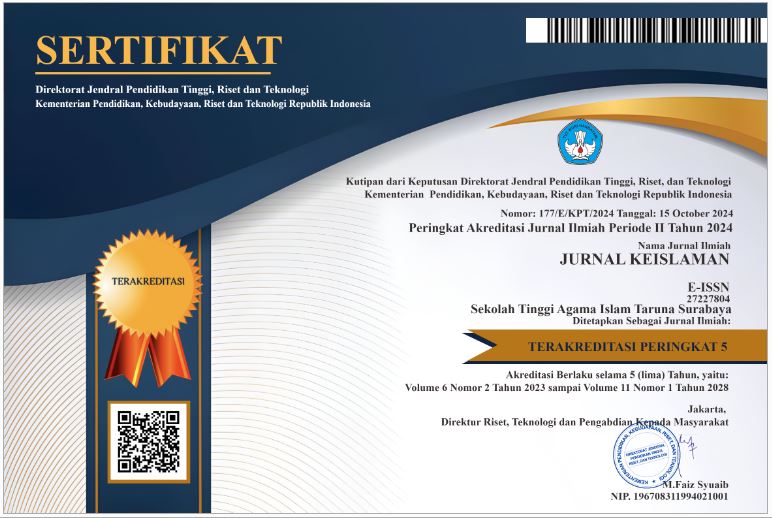Membentuk Generasi Taat Ibadah Melalui Program Ubudiyah di Sb Ampang Selangor Kuala Lumpur Malaysia
DOI:
https://doi.org/10.54298/jk.v8i2.630Keywords:
Ubudiyah, Worship, Character, Islamic Education, SB Ampang.Abstract
This research aims to determine the effectiveness of the ubudiyah program in shaping a generation of obedient worshippers at SB Ampang, Selangor, Kuala Lumpur. The background of this study is based on the reality that parents' busy work schedules lead to a lack of attention towards nurturing their children's worship practices. The ubudiyah program is introduced as an effort by the school to build the religious character of students through structured worship habituation. The research method used is a descriptive qualitative approach, with data collection techniques through observation, interviews, and documentation involving students, mentoring teachers, and parents. The research results indicate that the ubudiyah program runs effectively and has a significant impact on the worship quality of students, such as regularity in obligatory and Sunnah prayers, recitation of the Qur'an, as well as the formation of discipline and consistency in conducting worship. In addition to spiritual enhancement, this program also contributes to the intellectual development of students in understanding religious values. This success is supported by the role of guiding teachers, parental involvement, and a conducive school environment. However, challenges in program implementation were also found, such as the negative influence of gadgets and a busy academic schedule. The school responded to these challenges with intensive coaching strategies and adjustments to activity schedules. Overall, the ubudiyah program at SB Ampang has proven effective in shaping a generation that is devout in worship and possesses good character, and it can serve as a model for character education based on spirituality in the education environment Islam.
Downloads
References
Ralph Adolph, “Peningkatan Pemahaman Materi Fiqih Ubudiyah Melalui Kajian Kitab Ghoyah At Taqrib” 2, No. 6 (2016): 1–23.
Amaliyah Ubudiyah et al.n.d.
SD Negeri and Medan Tuntungan, “3) 1)2)3)” 6, no. 1 (2022): 77–86.
Anita Oktaviana et al., “Peran Pendidikdalam Menerapkan Pendidikan Akhlak Anak Usia Dini melalui Metode Pembiasaan,” Jurnal Obsesi: Jurnal Pendidikan Anak Usia Dini6, no. 5 (2022): 5298.
Fakhru al-Din al-Razy, Tafsῑr al-Rảzy, hlm. 417.
Suyadi & Ulfatin, N. (2020). Manajemen Pendidikan Karakter di Sekolah. Jakarta: Prenadamedia Group.halm,97
NU Online. (2023). “Pendidikan Spiritual Butuh Keterlibatan Keluarga dan Lingkungan.” Diakses dari: https://www.nu.or.id
Gunawan, H. (2019). Pendidikan Karakter: Konsep dan Implementasi. Bandung: Alfabeta. Halaman: 122
NU Online. (2023). “Pendidikan Islam Harus Adaptif terhadap Perkembangan Zaman dan Teknologi.” Diakses dari: https://www.nu.or.id pada 12 Juli 2025.
Purwanto. (2021). Pendidikan Karakter dalam Perspektif Islam. Yogyakarta: Deepublish. Halaman: 87
NU Online. (2023). "Ibadah Sejak Dini Bentuk Generasi Religius dan Cinta Damai". Diakses dari: https://www.nu.or.id pada 12 Juli 2025
Amanda Zahra Sabila et al., “Implementasi Program Bina Pribadi Islami ( BPI ) Dalam Pembinaan Karakter Siswa SDIT,” no. Prospek Iv (2024): 26–32.
Shâlih bin ‘Ali ‘Arrâd, Muqaddimah fi al-Tarbiyah al-Islâmiyah, (Riyâd: al-Dâr al-Shaulatiyah li al-Tarbiyah, 2003),hlm. 78.
Downloads
Published
How to Cite
Issue
Section
License
Copyright (c) 2025 Megawati Fajrin, Muqoffi, Moh. Khorofi, Wasik, Ali Wafa, Umar Faruq, Vina Eliana

This work is licensed under a Creative Commons Attribution-ShareAlike 4.0 International License.
Authors who publish with this journal agree to the following terms:
- Authors retain copyright and grant the journal right of first publication with the work simultaneously licensed under a Creative Commons Attribution-ShareAlike 4.0 that allows others to share the work with an acknowledgement of the work's authorship and initial publication in this journal.
- Authors are able to enter into separate, additional contractual arrangements for the non-exclusive distribution of the journal's published version of the work (e.g., post it to an institutional repository or publish it in a book), with an acknowledgement of its initial publication in this journal.
- Authors are permitted and encouraged to post their work online (e.g., in institutional repositories or on their website) prior to and during the submission process, as it can lead to productive exchanges, as well as earlier and greater citation of published work (See The Effect of Open Access).


















